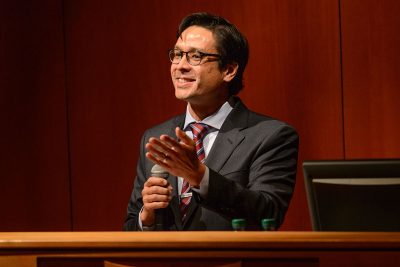 This past month, human rights education groups submitted a joint stakeholder report, based on research done through the Thomas J. Dodd Research Center and the Neag School of Education, to the U.N. Human Rights Council in anticipation of the U.S. mid-term review process for the Universal Periodic Review.
This past month, human rights education groups submitted a joint stakeholder report, based on research done through the Thomas J. Dodd Research Center and the Neag School of Education, to the U.N. Human Rights Council in anticipation of the U.S. mid-term review process for the Universal Periodic Review.
The report was prepared by lead researchers Glenn Mitoma, UConn assistant professor of human rights and curriculum and instruction; Kristina Eberbach, director of education programs at Columbia University’s Institute for the Study of Human Rights; and Felisa Tibbetts, lecturer in International and Comparative Education at Columbia University Teachers College, and submitted on behalf of Human Rights Educators USA (HRE USA) and the University and College Consortium for Human Rights Education (UCCHRE). The report documents need for greater human rights education across higher education institutions in the United States, and is based in part on research conducted by students in Mitoma’s Spring 2017 graduate course Human Rights and Social Justice in Education.

“The U.S. is not keeping up with international standards with respect to human rights education,” says Mitoma, “and the Universal Periodic Review process provides important opportunities for stakeholders and other civil society groups to contribute to a better understanding of how and where the U.S. is falling short, as well as where the bright spots and opportunities lay. Given UConn’s significant resources and experience in human right education, we were delighted to be a part of the team that assembled this report.”
The report is based on reviews of more than 133 higher education institutions in the United States for human rights and rights-related topics within the curriculum of schools of education, military academies, and schools of social work. The document recognizes promising practices, particularly in schools of social work, but calls for the U.S. government to encourage and support HRE in those institutions operated by the government, or receiving federal funding.
Much of the work of examining schools of education was conducted as part of a recent curriculum and instruction course, Human Rights and Social Justice in Education. Graduate students enrolled in the course examined mission statements, program descriptions, courses, and student activities in dozens of schools of education around the country for evidence of human rights content. Results revealed that there is little direct engagement with human rights knowledge, objectives, or skills in U.S. institutions.
“The Universal Periodic Review process provides important opportunities for stakeholders and other civil society groups to contribute to a better understanding of how and where the U.S. is falling short, as well as where the bright spots and opportunities lay. Given UConn’s significant resources and experience in human right education, we were delighted to be a part of the team that assembled this report.”
— Glenn Mitoma, assistant professor of human rights and curriculum and instruction
“Our research was another step along the path of accountability for human rights training in public service,” says Curt Murad ’16 (ED), ’17 MA, student researcher on the project. “We hope and expect that there will be more visibility of human rights in these sectors and tracking these now will hopefully inspire institutions, educators, and students to start to take more steps.”
This recent report builds on the first-ever Stakeholder Report on the status of human rights education that was submitted as part of the UPR review in 2015. This first report, carried out by HRE USA in cooperation with the US Human Right Network, overviewed the status of HRE in U.S. schools, drawing on a survey administered to members and incorporating other information from secondary sources such as policy reports and legislation. HRE USA emphasized the importance of the U.S. government in supporting HRE within state-level curriculum standards, teacher training and whole school attempts to reduce violence.
 Facebook
Facebook
 Twitter
Twitter
 LinkedIn
LinkedIn
